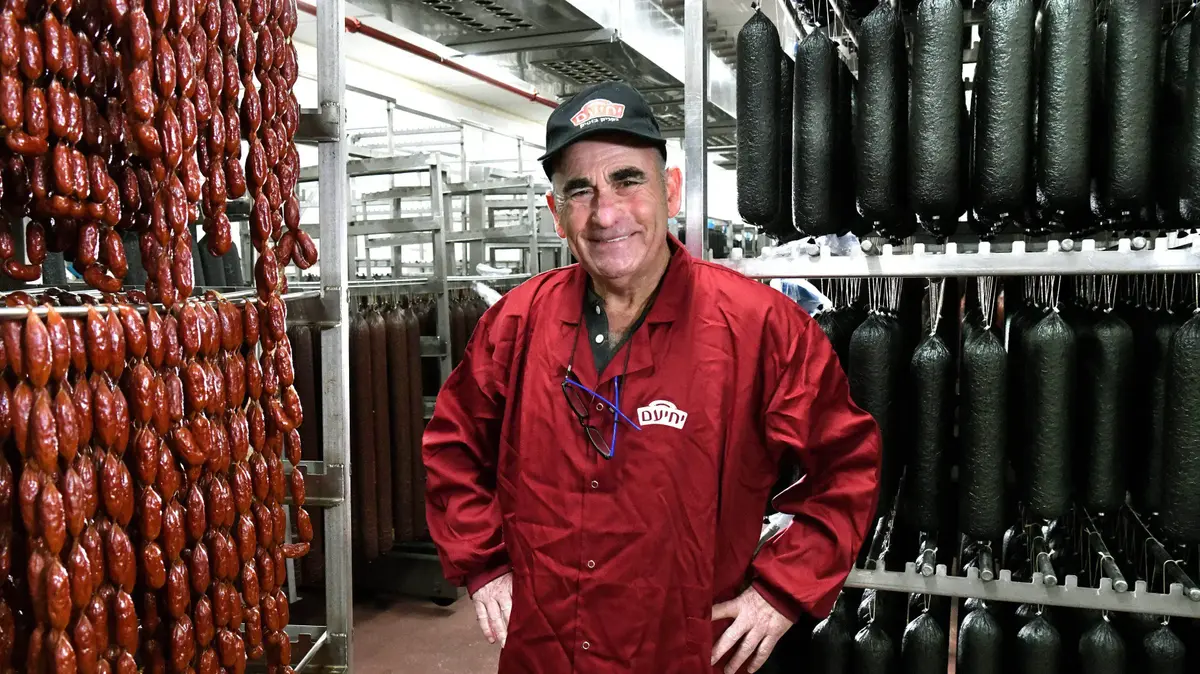Name: Yohai Naaman, 69 years old, CEO of Ma'edani Yehiam (Photo: Reuven Castro)
Who I am
: An open, creative person who values knowledge and education, along with investment.
The personal example is very important to me and with it modesty, knowing how to accept others, learn and work in a team.
Roots
: Father's parents from Chorna in Hungary.
Father decided to immigrate to Israel with his cousin after graduating from high school, at the age of 18, before the war and lost his entire family in it.
He moved from kibbutz to kibbutz, until he joined the founding core of Yechiam.
A decade ago, we went with him on a roots trip in Hungary, when a monument was erected in his city in memory of the Jews who were murdered in the Holocaust.
Mother was born in a small town in Hungary and lived in Budapest during the war and survived, because she was sick with tuberculosis and was hospitalized in a sanatorium.
She and two of her brothers survived.
One of them came to Jerusalem, the other became ultra-Orthodox in Neturi Karta in London and she came to Yahyam immediately after the war.
The parents met on the kibbutz, got married and my eldest brother was the first child born right on the kibbutz.
In the early years, father was a laborer, then he switched to accounting and at the age of 40 he decided to study, qualified as an accountant and did audits in all the kibbutzim.
Besides that, he was an amateur actor and wrote for Migrah and events in the kibbutz.
Mother was the first nurse of the kibbutz, an important position at the time, when there was no doctor available, and referrals trickled down to her.
My childhood
: I was born in Yahyam, the second of four children, the youngest is the writer Naomi Naaman.
By the end of the 6th grade we were in a shared dormitory, in a building where we studied, ate and slept together, a cohesive group of 20 children.
For me it was a wonderful, trauma-free experience.
In the 7th grade we moved to an institution with children from Kibbutz Gaaton and Evron, four to a room.
There were exams, but no certificates with numbers and no matriculation.
At the end of the twelfth year, we did a dissertation at the seminary level at the university. I wrote about the transition of officers from the army to citizenship and, among other things, I interviewed Ezer Weizman. I wanted to be a radio broadcaster, because I really like media and journalism. , I enlisted as a soldier and artillery officer.
"In the 7th grade I interviewed Ezer Weizman" (Photo: Reuven Castro)
Kibbutz
: From the age of 13 I worked in bananas.
Physical and interesting work.
In high school we went to work one full day a week and three times part-time work there and when I finished the service I returned to Bananas, after two years I became the banana center and then flew to work for a year in the security of merchant ships abroad. When I returned to Yahyam I asked to go to school.
Accounting
: I was 29 years old, I was accepted to a prep school in Jerusalem and at the end of it I wanted to enroll in communication studies and since there was no bachelor's degree in the field, I compromised on economics and accounting. In my last year of studies, I started doing an internship at the Fahan Cana office in Tel Aviv.
I was already married with a child and we moved to Kibbutz Nachshon which was in the middle of the road.
In my study group was Samdar Barber Tsadik, CEO of Bank Leumi, who was already brilliant at the time.
Ricky
: My wife, originally from Ma'alot, a teacher and kindergarten teacher, qualified at Oranim College, was a teacher at the regional school in Kibbutz Kabri and specialized in language studies, reading and writing.
She is a multi-tasker, talented in agriculture, literature and carpentry.
Her first job as a kindergarten teacher was at Hiiam and she lived two floors below me.
We got married and stayed in Yahyam.
After we lived in Nachshon and our firstborn was born, Riki was by no means ready for him to be sharing a room and due to her insistence and courage and the bubbling against her that was under the surface and burst out, the sharing room with Yahyam ended.
We have three children, none of them live in the kibbutz.
Farm center
: After I passed the certification exams and before the second internship year, the kibbutz pressured me to give it up and manage the kibbutz.
It was during the debt settlement period, when our financial situation was difficult and I received the traffic law.
Our conduct was wasteful and based on budgets and grants that ran out, and together with high inflation and a nominal interest rate that became real, the crash came.
Some of our debt was written off and some was repaid and we had to adopt a more sane lifestyle.
For example, most of the services, such as a hair salon or a clinic, were open until three in the afternoon and it was possible to make an appointment only at the expense of working hours. In my first month on the job, I had conversations with the service providers and asked them to open several times a week in the afternoon as well to increase productivity and everyone Agreed, things that were free, like taking a car when you feel like it, have become budgeted.
It was a difficult rehab process.
Yachiam delicacies
: In 1992 the factory entered a severe crisis and in 1993 I was jumped there with another guy to get him well, and I've been there ever since, next March I'll be celebrating 30 years.
I never felt like I was stepping on a spot.
You cannot bathe in the same river twice.
If you are open to experiences and interests, people change and situations change.
I had offers from other places over the years, once I even tried to be accepted, in coordination, to speak differently, and in the end I stayed.
When I entered I knew nothing about the meat field.
I asked the outgoing manager to stay for another month and a half.
I moved from department to department, I worked there until noon and then I met with the administration staff, interviewing, registering, studying, asking what changes should be made, a kind of internship.
We established a board of directors with an external chairman and separated the factory from the kibbutz, so that it would be run as a completely independent economic business and its decisions would be made according to market parameters. Management of a public company, without being traded on the stock exchange.
More in Walla!
The intriguing process of recycling metal packaging
In cooperation with the Tamir Recycling Corporation
The collapse of the economic model of the kibbutzim: "Our conduct was wasteful and based on budgets and grants that ran out" (Photo: Reuven Castro)
Price increase
: We contacted our customers and asked for permission to raise prices by 9.7%.
In all honesty, we raised the price for the last time in 2011 and until a year ago there was no reason for a factory like us to increase the price.
Over the years, the labor wage increased by 25%, but the other parameters did not increase and other companies made the products more expensive because the atmosphere allowed it.
Starting from July 2021, after the corona, the inputs increased a lot.
A year ago we applied and asked to update the price list and they did not approve it for us.
Now we have no choice.
We are not a losing company, but we don't want to get there.
Green Lantern:
The decision to sell the company was correct, because it increases the chance and reduces the risk.
We knew that if the kibbutz wanted to find a good partner, we would have to lose control.
The fund consists of talented people, with specialization in food with investments in companies like "Ged" and "Feldman", we work together for nine months.
On the one hand they are the owners of the house, but their desire for us to continue running the company and their assistance give results.
After the sale and my many years with the company, I didn't think of her in terms of grief.
About Green Lantern: "On the one hand, they are the owners of the house, but their desire for us to continue running the company and their assistance, give results" (Photo: Reuven Castro)
Competition
: very difficult.
Zoglubek and Tirat Zvi are very good friends, old and bigger than Yahyam, and Tirat Zvi belongs to Tnuva.
The market shares of each of them is about 35% each and we hold only 15%.
If you work economically, with a professional, high-quality and dedicated team of managers and employees, there is room for three companies.
Despite the fierce competition, if Bezoglovac gets stuck with a part in the machine, we will be happy to help them, and they will help us.
With Tirat Zvi this will not happen.
"Zoglovak and Tirat Zvi are very good friends" (Photo: Reuven Castro)
Abroad:
We have a subsidiary in the USA, which we acquired in 2012 in the field of beef, based in New Jersey and very strong in the kosher market.
Our exports to the USA are under the "Hod Golan" brand. At the moment we do not export to Europe, due to bird flu restrictions and the lack of certified chicken there in the country.
Marketing chains
: negotiations are underway with them regarding locations on the shelf.
If the market is sophisticated enough, and with us it certainly is, the locations first of all express the desire of the chains, assuming that they look at the map of competition and consumers, the relative give and take, strengths and weaknesses, they also bring to light the relative size and benefit to the consumer.
When you give good service to a good product for a long time, you can succeed with a relatively small amount of money to maintain good positions.
The strength of the brand also has meaning and the fact that we advertise less has an impact.
"I started running late, at the age of 58, at the age of 63 I did my first marathon" (Photo: Reuven Castro)
Leisure
: I started running late, at the age of 58, at the age of 63 I did my first marathon, and I am a member of the "Kfar Vardim Runners" group.
In February I will run a half marathon in the Dead Sea and at the age of 70 I hope to do one more marathon.
I run eight kilometers three times a week and 10-18 kilometers on the weekend.
Looking to the future
: Green Lantern asked me to continue managing the company for three years and I have another two years and three months left and then I will move on. Maybe I will go into teaching, and become a teacher For young children, I might want to serve as an active chairman of the company.
I will no longer fulfill my dream of becoming a journalist, but maybe I will finally sit down to write.
Of money
Tags
Yachiam delicacies
Marketing networks
green Lantern















